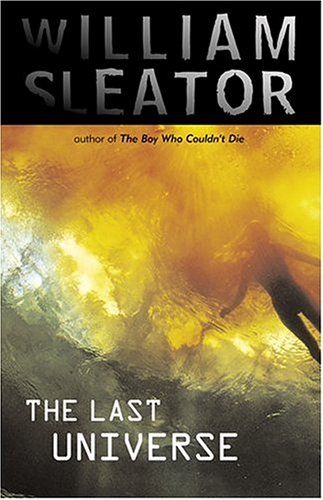 What begins as a rather mundane tale about a girl whose older brother has been crippled by multiple sclerosis transforms into something pretty amazing by the end. William Sleator is an author I've discovered only recently, and I'm glad I did. His stories tend to involve regular young teenagers who are cast into extraordinary circumstances, generally involving some bizarre science phenomenon. Boltzmon! has its hero meet an apparently real being that is able to teleport him between alternate worlds, and The Boxes introduces a young boy to clockwork creatures that are able to play with time. And now The Last Universe is about a pair of teenagers who discover the awesome, yet unpredictable, power of quantum mechanics. Yes, the human story, and even the story of the crippling disease, is rather weak. But when Sleator introduces the science elements, things begin to grow interesting, and I even learned a thing or two about quantum mechanics.
What begins as a rather mundane tale about a girl whose older brother has been crippled by multiple sclerosis transforms into something pretty amazing by the end. William Sleator is an author I've discovered only recently, and I'm glad I did. His stories tend to involve regular young teenagers who are cast into extraordinary circumstances, generally involving some bizarre science phenomenon. Boltzmon! has its hero meet an apparently real being that is able to teleport him between alternate worlds, and The Boxes introduces a young boy to clockwork creatures that are able to play with time. And now The Last Universe is about a pair of teenagers who discover the awesome, yet unpredictable, power of quantum mechanics. Yes, the human story, and even the story of the crippling disease, is rather weak. But when Sleator introduces the science elements, things begin to grow interesting, and I even learned a thing or two about quantum mechanics.For Susan, it is sad that her brother is slowly dying from a disease that physically weakens him, but it's also a drag. She's stuck at home, being kicked off her instant message chats with friends in order to take her brother, Gary, for walks in his wheelchair. He likes to go for walks around the expansive garden that comprises the backyard, though he isn't necessarily piqued by the idea that he can't actually walk himself. In the backyard they often run into the gardener from Cambodia, Luke, and his cat, oddly-named Sro-dee, though it makes sense later on (and for those who know a little about quantum mechanics). Lately, odd things have been happening in the garden. The pond where Susan and Gary's Aunt Caroline drowned has been growing lotus flowers, which Luke claims can't bloom in that sort of climate. Gary seems different too, sometimes more lively, sometimes sulky. He's interested in finding the maze that Susan can see from the kitchen window, but can't ever seem to find it in person, for some reason.
This story is about discovery. About discovering a scientific concept, a new part of the world, and trying to use it to improve oneself. Gary seeks a way to reverse his disease and is confident the maze holds the key. But discovery does not always go the way humans hope. This story shows what happens when people try to use the power of an unpredictable science for their own betterment. This isn't necessarily a story of hope or a story of warning, but a story about the unpredictability of life. No matter how strong-willed one is, and Gary and Susan are certainly strong-willed, the world doesn't bend to that will. I don't want to give away what happens, but I will end by saying that this is a story whose science elements makes it a much better story than it initially seems.
No comments:
Post a Comment